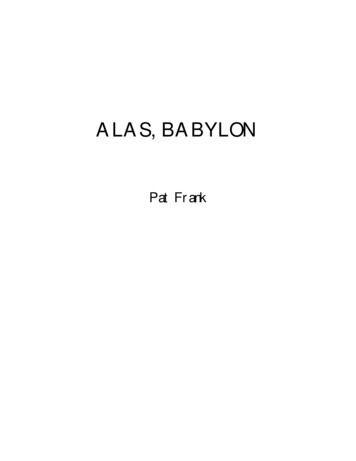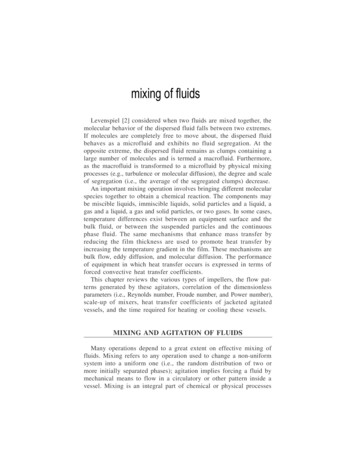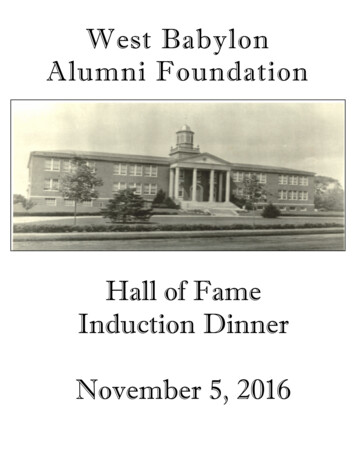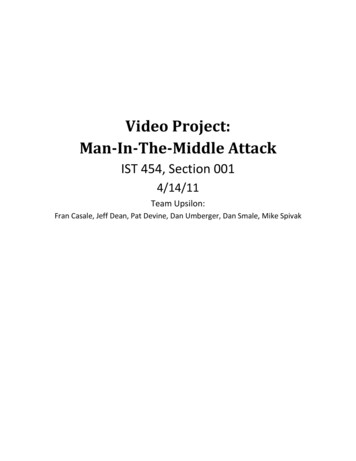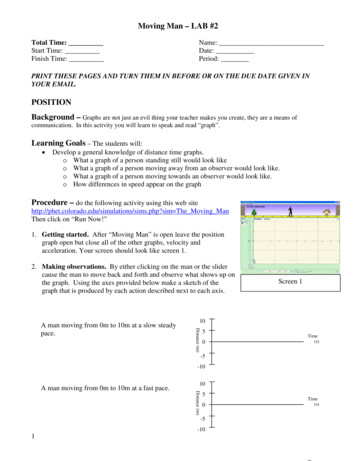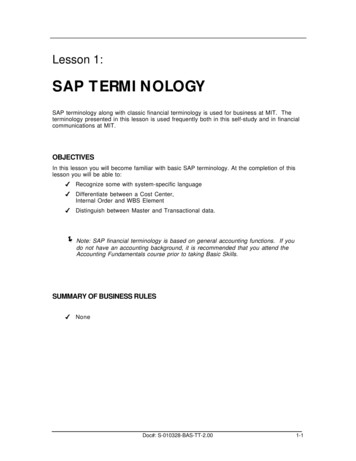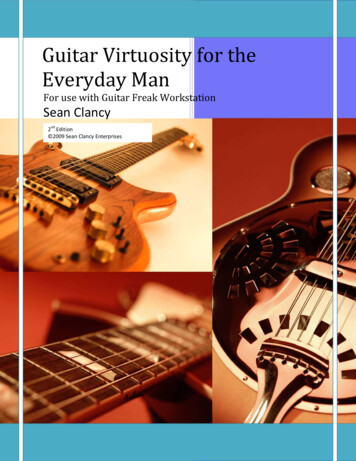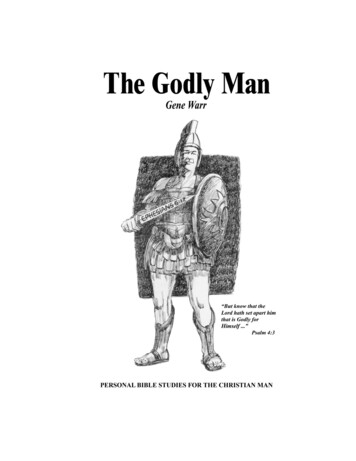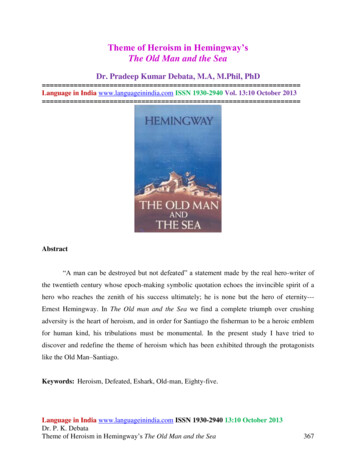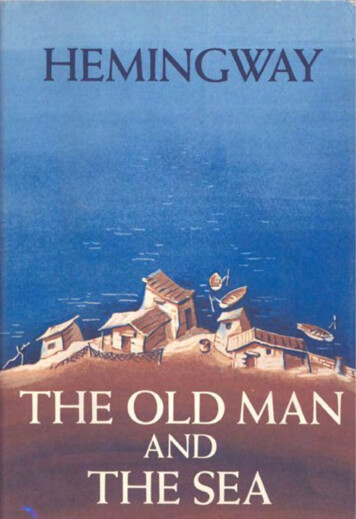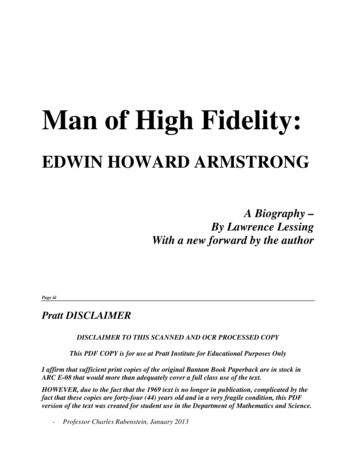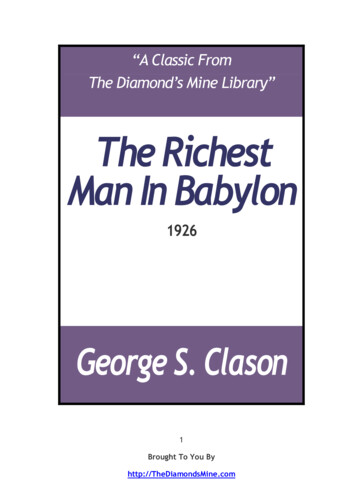
Transcription
“A Classic FromThe Diamond’s Mine Library”The RichestMan In Babylon1926George S. Clason1Brought To You Byhttp://TheDiamondsMine.com
The Richest Man In Babylon1926Public Domain NoticeThis classic writing compliments of The Diamond’s Mine Online Library. It ispublic domain and may be distributed freely.2Brought To You Byhttp://TheDiamondsMine.com
IndexAbout The Author . 6Foreword . 7An Historical Sketch of Babylon . 8The Man Who Desired Gold.14The Richest Man In Babylon .20Seven Cures For a Lean Purse .30The First Cure .34Start thy purse to fattening. . 34The Second Cure .37Control thy expenditures. . 37The Third Cure .39Make thy gold multiply. . 39The Fourth Cure.41Guard thy treasures from loss. . 41The Fifth Cure .43Make of thy dwelling a profitable investment. . 43The Sixth Cure .45Insure a future income. . 45The Seventh Cure .47Increase thy ability to earn. . 473Brought To You Byhttp://TheDiamondsMine.com
Meet the Goddess of Good Luck.50The Five Laws of Gold.62THE FIVE LAWS OF GOLD . 66The First Law of Gold. 70The Second Law of Gold . 70The Third Law of Gold. 70The Fourth Law of Gold . 71The Fifth Law of Gold . 71The Gold Lender of Babylon .73The Walls of Babylon .84The Camel Trader of Babylon.88The Clay Tablets From Babylon .98Tablet No. I . 99Tablet No. II. 100Tablet No. III. 101Tablet No. IV. 101Tablet No. V . 103The Luckiest Man In Babylon. 1074Brought To You Byhttp://TheDiamondsMine.com
Ahead of you stretches your future like a road leading into the distance.Along that road are ambitions you wish to accomplish desires you wish togratify.To bring your ambitions and desires to fulfillment, you must be successfulwith money. Use the financial principles made clear in the pages whichfollow. Let them guide you away from the stringencies of a lean purse tothat fuller, happier life a full purse makes possible.Like the law of gravity, they are universal and unchanging. May they provefor you, as they have proven to so many others, a sure key to a fat purse,larger bank balances and gratifying financial progress.LO, MONEY IS PLENTIFULFOR THOSE WHO UNDERSTANDTHE SIMPLE RULES OF ITS ACQUISITION1. Start thy purse to fattening2. Control thy expenditures3. Make thy gold multiply4. Guard thy treasures from loss5. Make of thy dwelling a profitable investment6. Insure a future income7. Increase thy ability to earn5Brought To You Byhttp://TheDiamondsMine.com
About The AuthorGEORGE SAMUEL CLASON was born in Louisiana, Missouri, on November 7,1874. He attended the University of Nebraska and served in the United StatesArmy during the Spanish-American War. Beginning a long career in publishing,he founded the Clason Map Company of Denver, Colorado, and published thefirst road atlas of the United States and Canada. In 1926, he issued the first ofa famous series of pamphlets on thrift and financial success, using parablesset in ancient Babylon to make each of his points. These were distributed inlarge quantities by banks and insurance companies and became familiar tomillions, the most famous being "The Richest Man in Babylon," the parablefrom which the present volume takes its title. These "Babylonian parables"have become a modern inspirational classic.6Brought To You Byhttp://TheDiamondsMine.com
ForewordOur prosperity as a nation depends upon the personal financial prosperity ofeach of us as individuals.This book deals with the personal successes of each of us. Success meansaccomplishments as the result of our own efforts and abilities. Properpreparation is the key to our success. Our acts can be no wiser than ourthoughts. Our thinking can be no wiser than our understanding.This book of cures for lean purses has been termed a guide to financialunderstanding. That, indeed, is its purpose: to offer those who are ambitiousfor financial success an insight which will aid them to acquire money, to keepmoney and to make their surpluses earn more money.In the pages which follow, we are taken back to Babylon, the cradle in whichwas nurtured the basic principles of finance now recognized and used theworld over.To new readers the author is happy to extend the wish that its pages maycontain for them the same inspiration for growing bank accounts, greaterfinancial successes and the solution of difficult personal financial problems soenthusiastically reported by readers from coast to coast.To the business executives who have distributed these tales in such generousquantities to friends, relatives, employees and associates, the author takesthis opportunity to express his gratitude. No endorsement could be higherthan that of practical men who appreciate its teachings because they,themselves, have worked up to important successes by applying the veryprinciples it advocates.Babylon became the wealthiest city of the ancient world because its citizenswere the richest people of their time. They appreciated the value of money.They practiced sound financial principles in acquiring money, keeping moneyand making their money earn more money. They provided for themselveswhat we all desire incomes for the future.G. S. C.7Brought To You Byhttp://TheDiamondsMine.com
An Historical Sketch of BabylonIn the pages of history there lives no city more glamorous than Babylon. Itsvery name conjures visions of wealth and splendor. Its treasures of gold andjewels were fabulous. One naturally pictures such a wealthy city as located ina suitable setting of tropical luxury, surrounded by rich natural resources offorests, and mines. Such was not the case. It was located beside theEuphrates River, in a flat, arid valley. It had no forests, no mines—not evenstone for building. It was not even located upon a natural trade-route. Therainfall was insufficient to raise crops.Babylon is an outstanding example of man's ability to achieve greatobjectives, using whatever means are at his disposal. All of the resourcessupporting this large city were man-developed. All of its riches were manmade.Babylon possessed just two natural resources—a fertile soil and water in theriver. With one of the greatest engineering accomplishments of this or anyother day, Babylonian engineers diverted the waters from the river by meansof dams and immense irrigation canals. Far out across that arid valley wentthese canals to pour the life giving waters over the fertile soil. This ranksamong the first engineering feats known to history. Such abundant crops aswere the reward of this irrigation system the world had never seen before.Fortunately, during its long existence, Babylon was ruled by successive linesof kings to whom conquest and plunder were but incidental. While it engagedin many wars, most of these were local or defensive against ambitiousconquerors from other countries who coveted the fabulous treasures ofBabylon. The outstanding rulers of Babylon live in history because of theirwisdom, enterprise and justice. Babylon produced no strutting monarchs whosought to conquer the known world that all nations might pay homage to theiregotism.As a city, Babylon exists no more. When those energizing human forces thatbuilt and maintained the city for thousands of years were withdrawn, it soonbecame a deserted ruin. The site of the city is in Asia about six hundred mileseast of the Suez Canal, just north of the Persian Gulf. The latitude is aboutthirty degrees above the Equator, practically the same as that of Yuma,8Brought To You Byhttp://TheDiamondsMine.com
Arizona. It possessed a climate similar to that of this American city, hot anddry.Today, this valley of the Euphrates, once a populous irrigated farmingdistrict, is again a wind-swept arid waste. Scant grass and desert shrubs strivefor existence against the windblown sands. Gone are the fertile fields, themammoth cities and the long caravans of rich merchandise. Nomadic bands ofArabs, securing a scant living by tending small herds, are the only inhabitants.Such it has been since about the beginning of the Christian era.Dotting this valley are earthen hills. For centuries, they were considered bytravelers to be nothing else. The attention of archaeologists were finallyattracted to them because of broken pieces of pottery and brick washeddown by the occasional rain storms. Expeditions, financed by European andAmerican museums, were sent here to excavate and see what could be found.Picks and shovels soon proved these hills to be ancient cities. City graves,they might well be called.Babylon was one of these. Over it for something like twenty centuries, thewinds had scattered the desert dust. Built originally of brick, all exposedwalls had disintegrated and gone back to earth once more. Such is Babylon,the wealthy city, today. A heap of dirt, so long abandoned that no livingperson even knew its name until it was discovered by carefully removing therefuse of centuries from the streets and the fallen wreckage of its nobletemples and palaces.Many scientists consider the civilization of Babylon and other cities in thisvalley to be the oldest of which there is a definite record. Positive dates havebeen proved reaching back 8000 years.An interesting fact in this connection is the means used to determine thesedates. Uncovered in the ruins of Babylon were descriptions of an eclipse ofthe sun. Modern astronomers readily computed the time when such aneclipse, visible in Babylon, occurred and thus established a knownrelationship between their calendar and our own.In this way, we have proved that 8000 years ago, the Sumerites, whoinhabited Babylonia, were living in walled cities. One can only conjecture forhow many centuries previous such cities had existed. Their inhabitants were9Brought To You Byhttp://TheDiamondsMine.com
not mere barbarians living within protecting walls. They were an educatedand enlightened people. So far as written history goes, they were the firstengineers, the first astronomers, the first mathematicians, the first financiersand the first people to have a written language.Mention has already been made of the irrigation systems which transformedthe arid valley into an agricultural paradise. The remains of these canals canstill be traced, although they are mostly filled with accumulated sand. Someof them were of such size that, when empty of water, a dozen horses couldbe ridden abreast along their bottoms. In size they compare favorably withthe largest canals in Colorado and Utah.In addition to irrigating the valley lands, Babylonian engineers completedanother project of similar magnitude. By means of an elaborate drainagesystem they reclaimed an immense area of swamp land at the mouths of theEuphrates and Tigris Rivers and put this also under cultivation.Herodotus, the Greek traveler and historian, visited Babylon while it was inits prime and has given us the only known description by an outsider. Hiswritings give a graphic description of the city and some of the unusualcustoms of its people. He mentions the remarkable fertility of the soil andthe bountiful harvest of wheat and barley which they produced.The glory of Babylon has faded but its wisdom has been preserved for us. Forthis we are indebted to their form of records. In that distant day, the use ofpaper had not been invented. Instead, they laboriously engraved their writingupon tablets of moist clay. When completed, these were baked and becamehard tile. In size, they were about six by eight inches, and an inch inthickness.These clay tablets, as they are commonly called, were used much as we usemodern forms of writing. Upon them were engraved legends, poetry, history,transcriptions of royal decrees, the laws of the land, titles to property,promissory notes and even letters which were dispatched by messengers todistant cities. From these clay tablets we are permitted an insight into theintimate, personal affairs of the people. For example, one tablet, evidentlyfrom the records of a country storekeeper, relates that upon the given date acertain named customer brought in a cow and exchanged it for seven sacks ofwheat, three being delivered at the time and the other four to await thecustomer's pleasure.10Brought To You Byhttp://TheDiamondsMine.com
Safely buried in the wrecked cities, archaeologists have recovered entirelibraries of these tablets, hundreds of thousands of them.One of the outstanding wonders of Babylon was the immense wallssurrounding the city. The ancients ranked them with the great pyramid ofEgypt as belonging to the "seven wonders of the world." Queen Semiramis iscredited with having erected the first walls during the early history of thecity. Modern excavators have been unable to find any trace of the originalwalls. Nor is their exact height known. From mention made by early writers,it is estimated they were about fifty to sixty feet high, faced on the outerside with burnt brick and further protected by a deep moat of water.The later and more famous walls were started about six hundred years beforethe time of Christ by King Nabopolassar. Upon such a gigantic scale did heplan the rebuilding, he did not live to see the work finished. This was left tohis son, Nebuchadnezzar, whose name is familiar in Biblical history.The height and length of these later walls staggers belief. They are reportedupon reliable authority to have been about one hundred and sixty feet high,the equivalent of the height of a modern fifteen story office building. Thetotal length is estimated as between nine and eleven miles. So wide was thetop that a six-horse chariot could be driven around them. Of this tremendousstructure, little now remains except portions of the foundations and themoat. In addition to the ravages of the elements, the Arabs completed thedestruction by quarrying the brick for building purposes elsewhere.Against the walls of Babylon marched, in turn, the victorious armies of almostevery conqueror of that age of wars of conquest. A host of kings laid siege toBabylon, but always in vain. Invading armies of that day were not to beconsidered lightly. Historians speak of such units as 10,000 horsemen,25,000 chariots, 1200 regiments of foot soldiers with 1000 men to theregiment. Often two or three years of preparation would be required toassemble war materials and depots of food along the proposed line of march.The city of Babylon was organized much like a modern city. There werestreets and shops.Peddlers offered their wares through residential districts. Priests officiated inmagnificent temples.11Brought To You Byhttp://TheDiamondsMine.com
Within the city was an inner enclosure for the royal palaces. The walls aboutthis were said to have been higher than those about the city.The Babylonians were skilled in the arts. These included sculpture, painting,weaving, gold working and the manufacture of metal weapons andagricultural implements. Their Jewellers created most artistic jewellery.Many samples have been recovered from the graves of its wealthy citizensand are now on exhibition in the leading museums of the world.At a very early period when the rest of the world was still hacking at treeswith stone-headed axes, or hunting and fighting with flint-pointed spears andarrows, the Babylonians were using axes, spears and arrows with metal heads.The Babylonians were clever financiers and traders. So far as we know, theywere the original inventors of money as a means of exchange, of promissorynotes and written titles to property.Babylon was never entered by hostile armies until about 540 years before thebirth of Christ.Even then the walls were not captured. The story of the fall of Babylon ismost unusual. Cyrus, one of the great conquerors of that period, intended toattack the city and hoped to take its impregnable walls.Advisors of Nabonidus, the King of Babylon, persuaded him to go forth tomeet Cyrus and give him battle without waiting for the city to be besieged. Inthe succeeding defeat to the Babylonian army, it fled away from the city.Cyrus, thereupon, entered the open gates and took possession withoutresistance.Thereafter the power and prestige of the city gradually waned until, in thecourse of a few hundred years, it was eventually abandoned, deserted, leftfor the winds and storms to level once again to that desert earth from whichits grandeur had originally been built. Babylon had fallen, never to rise again,but to it civilization owes much.The eons of time have crumbled to dust the proud walls of its temples, butthe wisdom of Babylon endures.12Brought To You Byhttp://TheDiamondsMine.com
Money is the medium by which earthly success is measured.Money makes possible the enjoyment of the best the earth affords.Money is plentiful for those who understand the simple laws which govern itsacquisition.Money is governed today by the same laws which controlled it whenprosperous men thronged the streets of Babylon, six thousand years ago.13Brought To You Byhttp://TheDiamondsMine.com
The Man Who Desired GoldBansir, the chariot builder of Babylon, was thoroughly discouraged. From hisseat upon the low wall surrounding his property, he gazed sadly at his simplehome and the open workshop in which stood a partially completed chariot.His wife frequently appeared at the open door. Her furtive glances in hisdirection reminded him that the meal bag was almost empty and he should beat work finishing the chariot, hammering and hewing, polishing and painting,stretching taut the leather over the wheel rims, preparing it for deliveryso he could collect from his wealthy customer.Nevertheless, his fat, muscular body sat stolidly upon the wall. His slow mindwas struggling patiently with a problem for which he could find no answer.The hot, tropical sun, so typical of this valley of the Euphrates, beat downupon him mercilessly. Beads of perspiration formed upon his brow andtrickled down unnoticed to lose themselves in tie hairy jungle on his chest.Beyond his home towered the high terraced wall surrounding the king'spalace. Nearby, cleaving the blue heavens, was the painted tower of theTemple of Bel. In the shadow of such grandeur was his simple home and manyothers far less neat and well cared for. Babylon was like this—a mixture ofgrandeur and squalor, of dazzling wealth and direst poverty, crowdedtogether without plan or system within the protecting walls of the city.Behind him, had he cared to turn and look, the noisy chariots of the richjostled and crowded aside the sandaled tradesmen as well as the barefootedbeggars. Even the rich were forced to turn into the gutters to clear the wayfor the long lines of slave water carriers, on the "King's Business," eachbearing a heavy goatskin of water to be poured upon the hanging gardens.Bansir was too engrossed in his own problem to hear or heed the confusedhubbub of the busy city. It was the unexpected twanging of the strings from afamiliar lyre that aroused him from his reverie. He turned and looked into thesensitive, smiling face of his best friend—Kobbi, the musician."May the Gods bless thee with great liberality, my good friend," began Kobbiwith an elaborate salute. "Yet, it does appear they have already been so14Brought To You Byhttp://TheDiamondsMine.com
generous thou needest not to labor. I rejoice with thee in thy good fortune.More, I would even share it with thee. Pray, from thy purse which must bebulging else thou wouldst be busy in your shop, extract but two humbleshekels and lend them to me until after the noblemen's feast this night. Thouwilt not miss them ere they are returned.""If I did have two shekels," Bansir responded gloomily, "to no one could I lendthem—not even to you, my best of friends; for they would be my fortune—myentire fortune. No one lends his entire fortune, not even to his best friend.""What," exclaimed Kobbi with genuine surprise, "Thou hast not one shekel inthy purse, yet sit like a statue upon a wall! Why not complete that chariot?How else canst thou provide for thy noble appetite? Tis not like thee, myfriend. Where is thy endless energy? Doth something distress thee? Havethe Gods brought to thee troubles?""A torment from the Gods it must be," Bansir agreed. "It began with a dream,a senseless dream, in which I thought I was a man of means. From my belthung a handsome purse, heavy with coins. There were shekels which I castwith careless freedom to the beggars; there were pieces of silver with which Idid buy finery for my wife and whatever I did desire for myself; there werepieces of gold which made me feel assured of the future and unafraid tospend the silver. A glorious feeling of contentment was within me! You wouldnot have known me for thy hardworking friend. Nor wouldst have known mywife, so free from wrinkles was her face and shining with happiness. She wasagain the smiling maiden of our early married days.""A pleasant dream, indeed," commented Kobbi, "but why should such pleasantfeelings as it aroused turn thee into a glum statue upon the wall?""Why, indeed! Because when I awoke and remembered how empty was mypurse, a feeling of rebellion swept over me. Let us talk it over together, for,as the sailors do say, we ride in the same boat, we two. As youngsters, wewent together to the priests to learn wisdom. As young men, we shared eachother's pleasures. As grown men, we have always been close friends. We havebeen contented subjects of our kind. We have been satisfied to work longhours and spend our earnings freely. We have earned much coin in the yearsthat have passed, yet to know the joys that come from wealth, we mustdream about them. Bah! Are we more than dumb sheep? We live in therichest city in all the world. The travelers do say none equals it in wealth.15Brought To You Byhttp://TheDiamondsMine.com
About us is much display of wealth, but of it we ourselves have naught. Afterhalf a lifetime of hard labor, thou, my best of friends, hast an empty purseand sayest to me, "May I borrow such a trifle as two shekels until after thenoblemen's feast this night?" Then, what do I reply? Do I say, "Here is mypurse; its contents will I gladly share?' No, I admit that my purse is as emptyas thine. What is the matter? Why cannot we acquire silver and gold—morethan enough for food and robes?"Consider, also, our sons," Bansir continued, "are they not 17following in thefootsteps of their fathers? Need they and their families and their sons andtheir sons' families live all their lives in the midst of such treasurers of gold,and yet, like us, be content to banquet upon sour goat's milk and porridge?""Never, in all the years of our friendship, didst thou talk like this before,Bansir." Kobbi was puzzled."Never in all those years did I think like this before. From early dawn untildarkness stopped me, I have labored to build the finest chariots any mancould make, soft- heartedly hoping some day the Gods would recognize myworthy deeds and bestow upon me great prosperity. This they have neverdone. At last, I realize this they will never do. Therefore, my heart is sad. Iwish to be a man of means. I wish to own lands and cattle, to have fine robesand coins in my purse. I am willing to work for these things with all thestrength in my back, with all the skill in my hands, with all the cunning in mymind, but I wish my labors to be fairly rewarded. What is the matter with us?Again I ask you! Why cannot we have our just share of the good things soplentiful for those who have the gold with which to buy them?""Would I knew an answer!" Kobbi replied. "No better than thou am I satisfied.My earnings from my lyre are quickly gone. Often must I plan and scheme thatmy family be not hungry. Also, within my breast is a deep longing for a lyrelarge enough that it may truly sing the strains of music that do surge throughmy mind. With such an instrument could I make music finer than even theking has heard before.""Such a lyre thou shouldst have. No man in all Babylon could make it singmore sweetly; could make it sing so sweetly, not only the king but the Gods16Brought To You Byhttp://TheDiamondsMine.com
themselves would be delighted. But how mayest thou secure it while we bothof us are as poor as the king's slaves? Listen to the bell! Here they come."He pointed to the long column of half naked, sweating water bearers ploddinglaboriously up the narrow street from the river. Five abreast they marched,each bent under a heavy goatskin of water."A fine figure of a man, he who doth lead them." Kobbi indicated the wearerof the bell who marched in front without a load. "A prominent man in his owncountry, 'tis easy to see.""There are many good figures in the line," Bansir agreed, "as good men as we.Tall, blond men from the north, laughing black men from the south, littlebrown men from the nearer countries. All marching together from the river tothe gardens, back and forth, day after day, year after year. Naught ofhappiness to look forward to. Beds of straw upon which to sleep—hard grainporridge to eat. Pity the poor brutes, Kobbi!""Pity them I do. Yet, thou dost make me see how little better off are we, freemen though we call ourselves."That is truth, Kobbi, unpleasant thought though it be. We do not wish to goon year after year living slavish lives. Working, working, working! Gettingnowhere.""Might we not find out how others acquire gold and do as they do?" Kobbiinquired.“Perhaps there is some secret we might learn if we but sought from thosewho knew," replied Bansir thoughtfully.“This very day,” suggested Kobbi, "I did pass our old friend, Arkad, riding inhis golden chariot. This I will say, he did not look over my humble head asmany in his station might consider his right. Instead, he did wave his handthat all onlookers might see him pay greetings and bestow his smile offriendship upon Kobbi, the musician.""He is claimed to be the richest man in all Babylon," Bansir mused.17Brought To You Byhttp://TheDiamondsMine.com
"So rich the king is said to seek his golden aid in affairs of the treasury," Kobbireplied. "So rich," Bansir interrupted, "I fear if I should meet him in thedarkness of the night, I should lay my hands upon his fat wallet.""Nonsense," reproved Kobbi, "a man's wealth is not in the purse he carries. Afat purse quickly empties if there be no golden stream to refill it. Arkad hasan income that constantly keeps his purse full, no matter how liberally hespends.""Income, that is the thing," ejaculated Bansir. "I wish an income that will keepflowing into my purse whether I sit upon the wall or travel to far lands. Arkadmust know how a man can make an income for himself. Dost suppose it issomething he could make clear to a mind as slow as mine?""Methinks he did teach his knowledge to his son, Nomasir," Kobbi responded."Did he not go to Nineveh and, so it is told at the inn, become, without aidfrom his father, one of the richest men in that city?""Kobbi, thou bringest to me a rare thought." A new light gleamed in Bansir'seyes. "It costs nothing to ask wise advice from a good friend and Arkad wasalways that. Never mind though our purses be as empty as the falcon's nest ofa year ago. Let that not detain us. We are weary of being without gold in themidst of plenty. We wish to become men of means. Come, let us go to Arkadand ask how we, also, may acquire incomes for ourselves."Thou speakest with true inspiration, Bansir. Thou bringeth to my mind a newunderstanding.Thou makest me to realize the reason why we have never found any measureof wealth. We never sought it. Thou hast labored patiently to build thestaunchest chariots in Babylon. To that purpose was devoted your bestendeavors. Therefore, at it thou didst succeed. I strove to become a skillfullyre player. And, at it I did succeed."In those things toward which we exerted our best endeavors we succeeded.The Gods were content to let us continue thus. Now, at last, we see a light,bright like that from the rising sun. It biddeth us to learn more that we mayprosper more. With a new understanding we shall find honourable ways toaccomplish our desires."18Brought To You Byhttp://TheDiamondsMine.com
"Let us go to Arkad this very day," Bansir urge
with money. Use the financial principles made clear in the pages which follow. Let them guide you away from the stringencies of a lean purse to that fuller, happier life a full purse makes possible. Like the law of gravity, they are universal and unchanging. May they prove for you, as they
